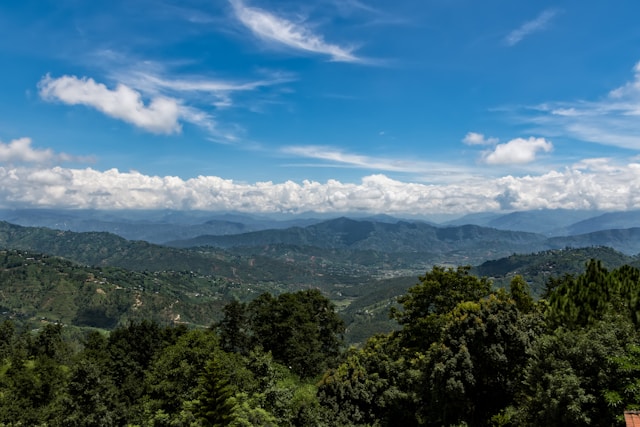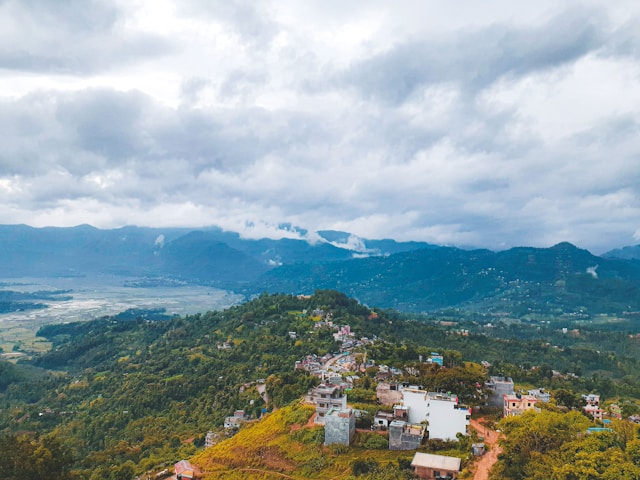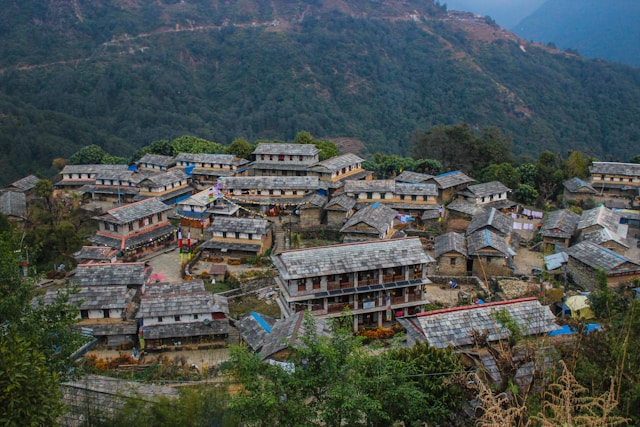Nestled in the lap of the Himalayan foothills, Dhulikhel is more than just a scenic town—it is a living example of sustainable mountain living that harmonizes traditional practices with modern eco-conscious innovations. With panoramic views of the snow-capped peaks and a deep-rooted Newari culture, Dhulikhel showcases how communities can thrive while safeguarding their natural surroundings. As urban centers wrestle with environmental degradation, Dhulikhel shines as a beacon of ecological resilience, green tourism, and sustainable livelihoods.
The Natural Allure of Dhulikhel: A Gateway to Sustainability
Dhulikhel lies at an altitude of approximately 1,550 meters above sea level and is blessed with unparalleled biodiversity, clean air, and unobstructed Himalayan vistas. The region’s temperate climate supports diverse flora and fauna, while its terraced farms demonstrate age-old water conservation and soil management techniques. Unlike many urbanized towns, Dhulikhel has retained its green cover, largely thanks to community forestry initiatives and responsible urban planning.
Eco-Friendly Architecture and Green Infrastructure
One of Dhulikhel’s standout features is its emphasis on eco-architecture. Local builders incorporate natural materialssuch as stone, bamboo, and mud bricks to reduce carbon footprints. Houses and public buildings are often designed to optimize solar exposure, natural ventilation, and rainwater harvesting. This architectural style not only preserves the aesthetic harmony of the town but also minimizes dependency on external energy sources.
Green roofs, solar panels, and bio-sand water filters have been gradually adopted by households, hotels, and community centers. These technologies have helped in energy efficiency and waste minimization, reinforcing Dhulikhel’s commitment to a low-impact lifestyle.
Community-Led Sustainability Projects
The strength of Dhulikhel lies in its people. Numerous grassroots organizations, youth clubs, and women’s cooperatives play vital roles in shaping a sustainable future. Community-based programs focus on waste management, organic farming, and renewable energy training.
For example, the Dhulikhel Environment Protection and Promotion Committee (DEPC) runs regular awareness campaigns and collaborates with local schools to instill environmental ethics in younger generations. Locals are actively engaged in tree plantation drives, composting workshops, and clean-up events, ensuring community participation in all stages of sustainability efforts.
Water Management and Access to Clean Resources
Dhulikhel’s strategic approach to water management stands as a national example. The Dhulikhel Water Supply Project, implemented with the help of international partners, ensures equitable access to clean drinking water without depleting groundwater or harming upstream resources. Rainwater harvesting tanks, gravity-fed water systems, and eco-friendly filtration units have transformed water security in the town.

These projects have proven essential not only for household consumption but also for supporting agriculture, which remains the backbone of the local economy.
Sustainable Agriculture and Organic Practices
The terraces that adorn the hills of Dhulikhel are more than just scenic—they are the product of sustainable farming traditions. Farmers here embrace organic farming, using compost manure, bio-pesticides, and crop rotationtechniques to enrich soil fertility and preserve local ecosystems.
Local farmers’ markets promote farm-to-table models, connecting producers directly with consumers. This reduces carbon emissions related to food transportation while also providing economic empowerment to rural households.
Additionally, agritourism is emerging as a new revenue stream, allowing tourists to engage in planting, harvesting, and learning about indigenous farming knowledge.
Green Tourism: Balancing Footfall with Preservation
Dhulikhel’s approach to tourism is notably mindful. The town markets itself as an eco-tourism destination, attracting visitors interested in nature trails, bird watching, mountain biking, and spiritual retreats. Hotels and lodges are encouraged to follow eco-certification standards, utilize solar energy, and implement zero-waste policies.
Guided tours often include educational content about local culture, sustainability practices, and biodiversity conservation, turning tourism into a channel for awareness and advocacy.
In partnership with NGOs and governmental agencies, Dhulikhel is now developing low-impact trekking routes and community homestay programs that distribute tourism benefits more equitably among the local population.
Cultural Conservation and Heritage Sustainability
Sustainability in Dhulikhel goes hand-in-hand with cultural preservation. The town boasts several ancient temples, traditional Newari architecture, and sacred water sources, all of which are maintained through community stewardship and sustainable tourism revenue.
Annual festivals, cultural performances, and local artisanship workshops serve to preserve and revitalize intangible heritage. These traditions not only attract cultural tourism but also fortify a collective identity centered on environmental stewardship.
Education and Capacity Building for the Future
At the heart of Dhulikhel’s success in sustainability is its emphasis on education and capacity building. Institutions like Kathmandu University, located just outside the town, offer specialized programs in environmental science, sustainable development, and rural innovation. Through research partnerships and community outreach programs, the university has played a pivotal role in enhancing local knowledge systems and training future sustainability leaders.
Furthermore, schools in Dhulikhel integrate environmental studies, climate change education, and hands-on eco-projects, ensuring that sustainability is woven into the curriculum from an early age.
Renewable Energy Adoption and Energy Independence
A major achievement in Dhulikhel’s sustainability journey is its transition toward renewable energy. The town has made substantial investments in solar panels, biogas digesters, and micro-hydro plants. Households now generate a significant portion of their electricity needs from non-polluting sources, decreasing reliance on fossil fuels.
In rural peripheries, solar-powered lighting and cookstoves have transformed quality of life, especially for women and children, by reducing indoor air pollution and saving hours previously spent collecting firewood.
Waste Management and Zero-Waste Goals
Dhulikhel has adopted a segregate-at-source policy for waste collection, encouraging residents to separate biodegradable and non-biodegradable waste. Municipal waste recycling centers, compost pits, and plastic reduction campaigns are part of a comprehensive zero-waste roadmap.
Local businesses are incentivized to shift to eco-packaging, while educational drives teach residents the benefits of reuse, repurpose, and recycle. Several wards in Dhulikhel are already reporting significant waste volume reductions thanks to these integrated strategies.
Conclusion: Dhulikhel as a Blueprint for Sustainable Mountain Towns
Dhulikhel stands out as a model town for sustainable mountain living, not only in Nepal but across South Asia. Its blend of community engagement, eco-tourism, green technology, and cultural preservation makes it a compelling blueprint for other regions aiming to strike a balance between development and environmental protection. As global attention shifts toward resilience in the face of climate change, Dhulikhel offers concrete, replicable solutions rooted in tradition, innovation, and unity.


